2019英语六级翻译每日一练及译文(1)
2019年12月英语六级听力原文和问答翻译
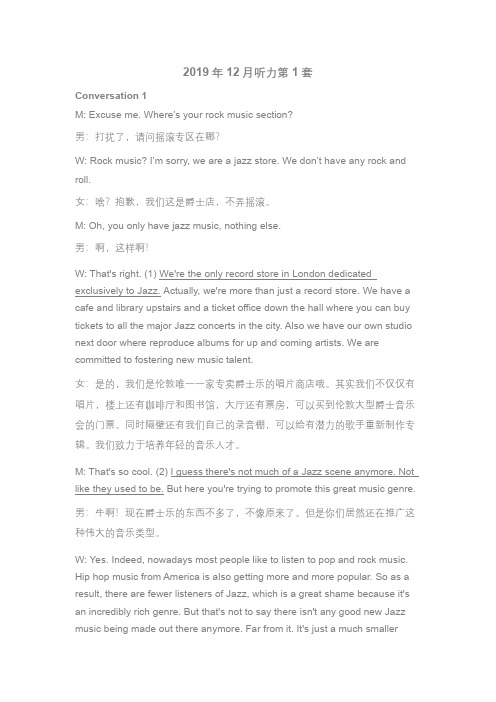
2019年12月听力第1套Conversation 1M: Excuse me. Where’s your rock music section?男:打扰了,请问摇滚专区在哪?W: Rock music? I’m sorry, we are a jazz store. We don’t have any rock and roll.女:啥?抱歉,我们这是爵士店,不弄摇滚。
M: Oh, you only have jazz music, nothing else.男:啊,这样啊!W: That's right.(1) We're the only record store in London dedicated exclusively to Jazz.Actually, we're more than just a record store. We have a cafe and library upstairs and a ticket office down the hall where you can buy tickets to all the major Jazz concerts in the city. Also we have our own studio next door where reproduce albums for up and coming artists. We are committed to fostering new music talent.女:是的,我们是伦敦唯一一家专卖爵士乐的唱片商店哦。
其实我们不仅仅有唱片,楼上还有咖啡厅和图书馆,大厅还有票房,可以买到伦敦大型爵士音乐会的门票。
同时隔壁还有我们自己的录音棚,可以给有潜力的歌手重新制作专辑。
我们致力于培养年轻的音乐人才。
M: That's so cool.(2) I guess there's not much of a Jazz scene anymore. Not like they used to be.But here you're trying to promote this great music genre.男:牛啊!现在爵士乐的东西不多了,不像原来了。
2019年12月英语六级真题:CET-6翻译真题【三套完整版带答案】
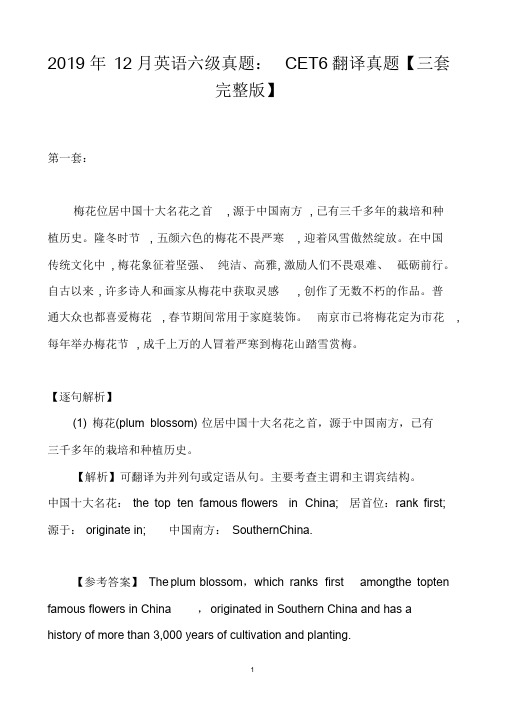
2019 年12 月英语六级真题:CET6翻译真题【三套完整版】第一套:梅花位居中国十大名花之首, 源于中国南方, 已有三千多年的栽培和种植历史。
隆冬时节, 五颜六色的梅花不畏严寒, 迎着风雪傲然绽放。
在中国传统文化中, 梅花象征着坚强、纯洁、高雅, 激励人们不畏艰难、砥砺前行。
自古以来, 许多诗人和画家从梅花中获取灵感, 创作了无数不朽的作品。
普通大众也都喜爱梅花, 春节期间常用于家庭装饰。
南京市已将梅花定为市花, 每年举办梅花节, 成千上万的人冒着严寒到梅花山踏雪赏梅。
【逐句解析】(1) 梅花(plum blossom) 位居中国十大名花之首,源于中国南方,已有三千多年的栽培和种植历史。
【解析】可翻译为并列句或定语从句。
主要考查主谓和主谓宾结构。
中国十大名花:the top ten famous flowers in China; 居首位:rank first;源于:originate in; 中国南方:SouthernChina.【参考答案】The plum blossom,which ranks first amongthe topten famous flowers in China ,originated in Southern China and has ahistory of more than 3,000 years of cultivation and planting.(2) 隆冬时节,五颜六色的梅花不畏严寒,迎着风雪傲然绽放。
【解析】可翻译为并列句或简单句和伴随状语。
五颜六色的:colorful/of all colors 绽放:bloom; 迎着风雪:against the snow.【参考答案】At the time of midwinter, plum blossoms of all colors are not afraid of the cold, blooming proudly against the snow.(3) 在中国传统文化中,梅花象征着坚强、纯洁、高雅、激励人们不畏艰难、砥砺前行。
2019英语六级考试翻译练习题及详解(1)
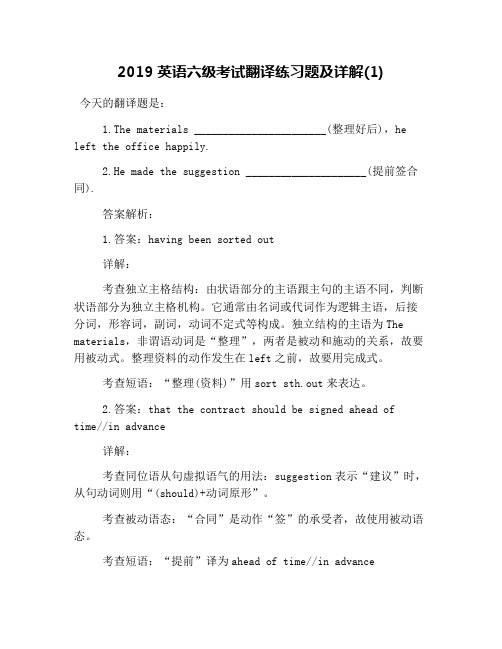
2019英语六级考试翻译练习题及详解(1)
今天的翻译题是:
1.The materials _______________________(整理好后),he left the office happily.
2.He made the suggestion _____________________(提前签合同).
答案解析:
1.答案:having been sorted out
详解:
考查独立主格结构:由状语部分的主语跟主句的主语不同,判断状语部分为独立主格机构。
它通常由名词或代词作为逻辑主语,后接分词,形容词,副词,动词不定式等构成。
独立结构的主语为The materials,非谓语动词是“整理”,两者是被动和施动的关系,故要用被动式。
整理资料的动作发生在left之前,故要用完成式。
考查短语:“整理(资料)”用sort sth.out来表达。
2.答案:that the contract should be signed ahead of
time//in advance
详解:
考查同位语从句虚拟语气的用法:suggestion表示“建议”时,从句动词则用“(should)+动词原形”。
考查被动语态:“合同”是动作“签”的承受者,故使用被动语态。
考查短语:“提前”译为ahead of time//in advance。
英语六级考试翻译模拟题附参考译文
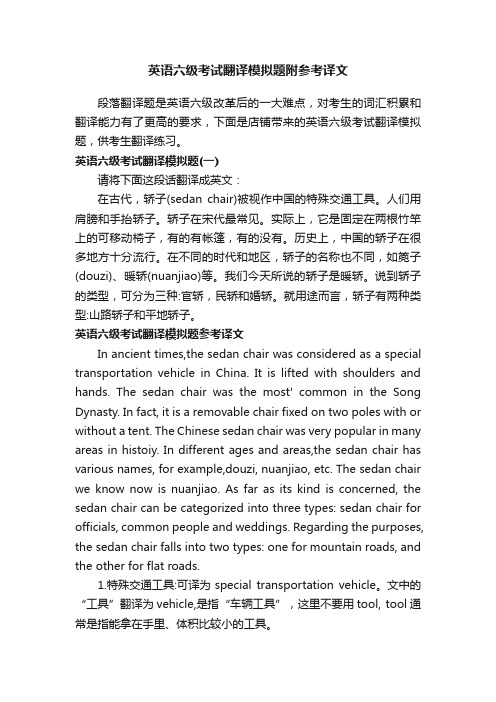
英语六级考试翻译模拟题附参考译文段落翻译题是英语六级改革后的一大难点,对考生的词汇积累和翻译能力有了更高的要求,下面是店铺带来的英语六级考试翻译模拟题,供考生翻译练习。
英语六级考试翻译模拟题(一)请将下面这段话翻译成英文:在古代,轿子(sedan chair)被视作中国的特殊交通工具。
人们用肩膀和手抬轿子。
轿子在宋代最常见。
实际上,它是固定在两根竹竿上的可移动椅子,有的有帐篷,有的没有。
历史上,中国的轿子在很多地方十分流行。
在不同的时代和地区,轿子的名称也不同,如篼子(douzi)、暖轿(nuanjiao)等。
我们今天所说的轿子是暖轿。
说到轿子的类型,可分为三种:官轿,民轿和婚轿。
就用途而言,轿子有两种类型:山路轿子和平地轿子。
英语六级考试翻译模拟题参考译文In ancient times,the sedan chair was considered as a special transportation vehicle in China. It is lifted with shoulders and hands. The sedan chair was the most' common in the Song Dynasty. In fact, it is a removable chair fixed on two poles with or without a tent. The Chinese sedan chair was very popular in many areas in histoiy. In different ages and areas,the sedan chair has various names, for example,douzi, nuanjiao, etc. The sedan chair we know now is nuanjiao. As far as its kind is concerned, the sedan chair can be categorized into three types: sedan chair for officials, common people and weddings. Regarding the purposes, the sedan chair falls into two types: one for mountain roads, and the other for flat roads.1.特殊交通工具:可译为special transportation vehicle。
2019年六级翻译作文练习题
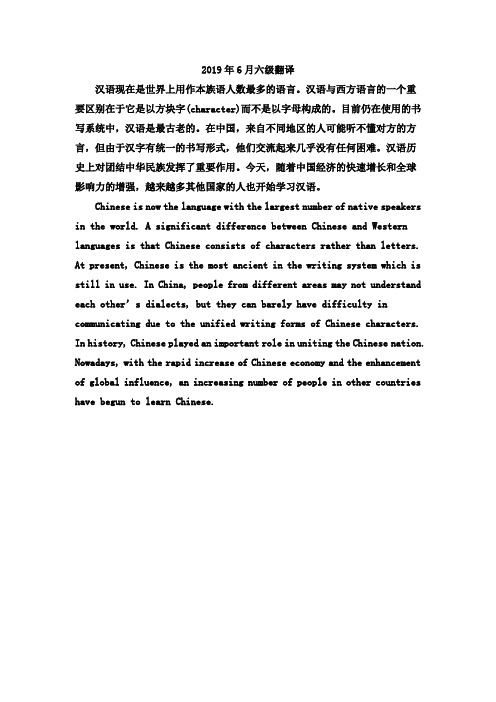
2019年6月六级翻译汉语现在是世界上用作本族语人数最多的语言。
汉语与西方语言的一个重要区别在于它是以方块字(character)而不是以字母构成的。
目前仍在使用的书写系统中,汉语是最古老的。
在中国,来自不同地区的人可能听不懂对方的方言,但由于汉字有统一的书写形式,他们交流起来几乎没有任何困难。
汉语历史上对团结中华民族发挥了重要作用。
今天,随着中国经济的快速增长和全球影响力的增强,越来越多其他国家的人也开始学习汉语。
Chinese is now the language with the largest number of native speakers in the world. A significant difference between Chinese and Western languages is that Chinese consists of characters rather than letters. At present, Chinese is the most ancient in the writing system which is still in use. In China, people from different areas may not understand each other’s dialects, but they can barely have difficulty in communicating due to the unified writing forms of Chinese characters. In history, Chinese played an important role in uniting the Chinese nation. Nowadays, with the rapid increase of Chinese economy and the enhancement of global influence, an increasing number of people in other countries have begun to learn Chinese.成语(Chinese idioms)是汉语中的一种独特的表达方式,大多由四个汉字组成。
2019年6月六级翻译练习与解析(上)
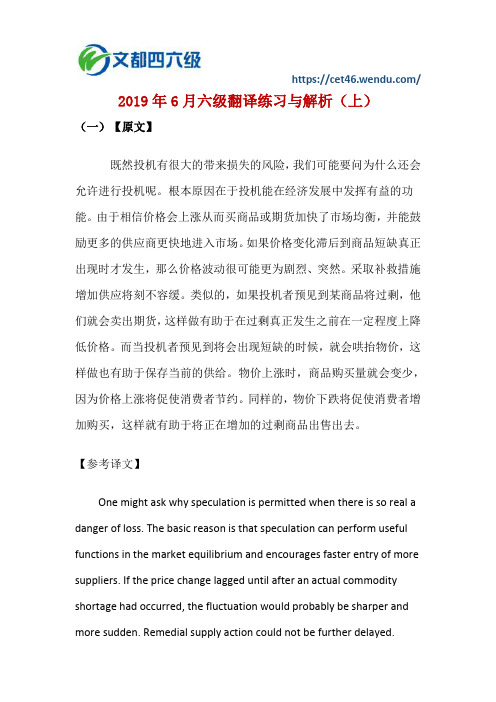
https:/// 2019年6月六级翻译练习与解析(上)(一)【原文】既然投机有很大的带来损失的风险,我们可能要问为什么还会允许进行投机呢。
根本原因在于投机能在经济发展中发挥有益的功能。
由于相信价格会上涨从而买商品或期货加快了市场均衡,并能鼓励更多的供应商更快地进入市场。
如果价格变化滞后到商品短缺真正出现时才发生,那么价格波动很可能更为剧烈、突然。
采取补救措施增加供应将刻不容缓。
类似的,如果投机者预见到某商品将过剩,他们就会卖出期货,这样做有助于在过剩真正发生之前在一定程度上降低价格。
而当投机者预见到将会出现短缺的时候,就会哄抬物价,这样做也有助于保存当前的供给。
物价上涨时,商品购买量就会变少,因为价格上涨将促使消费者节约。
同样的,物价下跌将促使消费者增加购买,这样就有助于将正在增加的过剩商品出售出去。
【参考译文】One might ask why speculation is permitted when there is so real a danger of loss. The basic reason is that speculation can perform useful functions in the market equilibrium and encourages faster entry of more suppliers. If the price change lagged until after an actual commodity shortage had occurred, the fluctuation would probably be sharper and more sudden. Remedial supply action could not be further delayed.https:/// Similarly, if speculators foresee a surplus in some commodity, their selling of futures will help drive the price down to some extent before the surplus actually occurs. When speculators foresee a shortage and bid up the price, they are also helping to conserve the present supply. As the price goes up, less of the commodity is purchased; a rise in price encourages users to economize. Similarly, a lowering of price encourages users to buy more, thus helping to sell the surplus which is developing.(二)【原文】星期四这天,围观者们聚集在一起观看暴风的时候,台风“潭美”(Typhoon Trami)引发的60英尺高的海水,在海宁市附近的海岸突然落下。
大学英语六级翻译训练及译文及相关解析

大学英语六级【翻译】训练及译文及【相关解析】第一期1.翻译原文:四合院(courtyard)是一种历史类型住宅。
它在中国很常见,最著名的则是在北京。
在古代,一座四合院住着一个单一的大家庭。
今天,许多现存的四合院还用作住房,但大都缺乏现代生活设施。
四合院最早可以追溯到西周时期(theWestern Zhou Period),至今已有2000多年的历史。
它们表现出中国建筑的优秀和基本特征。
四合院还是北京的一个文化象征,也是探索古老生活方式的一个窗口。
参考译文:Courtyard is a historical type of residence.It wascommonly found throughout China,most famous inBeijing.In ancient times,a courtyard would beoccupied by a single large family.Today,manyremaining courtyards are still used ashouses,butmost lack modem living facilities.Courtyards date back to as early as the Western ZhouPeriod,with a history of over 2,000 years.They exhibit outstanding and iundamentalcharacteristics of Chinese architecture.Courtyard also serves as a cultural symbol of Beijingand a window into old ways of life.1.在古代,一座四合院住着一个单一的大家庭:“在古代”可译为in ancient times。
“住着”可以用occupy或者live来表示。
2019年12月英语六级真题翻译答案及解析
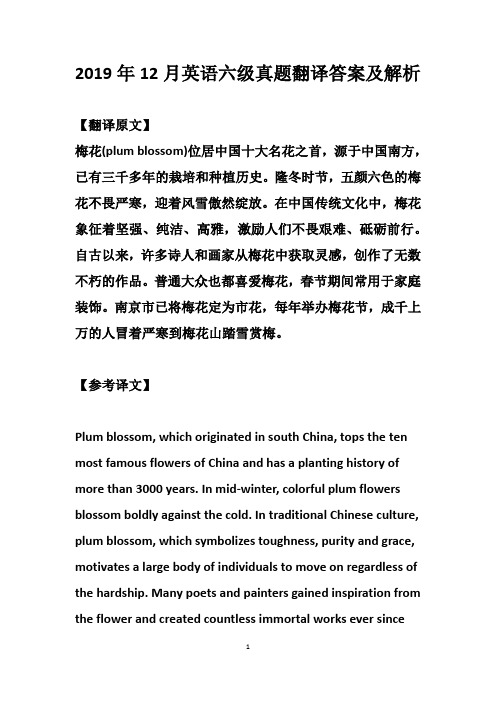
2019年12月英语六级真题翻译答案及解析【翻译原文】梅花(plum blossom)位居中国十大名花之首,源于中国南方,已有三千多年的栽培和种植历史。
隆冬时节,五颜六色的梅花不畏严寒,迎着风雪傲然绽放。
在中国传统文化中,梅花象征着坚强、纯洁、高雅,激励人们不畏艰难、砥砺前行。
自古以来,许多诗人和画家从梅花中获取灵感,创作了无数不朽的作品。
普通大众也都喜爱梅花,春节期间常用于家庭装饰。
南京市已将梅花定为市花,每年举办梅花节,成千上万的人冒着严寒到梅花山踏雪赏梅。
【参考译文】Plum blossom, which originated in south China, tops the ten most famous flowers of China and has a planting history of more than 3000 years. In mid-winter, colorful plum flowers blossom boldly against the cold. In traditional Chinese culture, plum blossom, which symbolizes toughness, purity and grace, motivates a large body of individuals to move on regardless of the hardship. Many poets and painters gained inspiration from the flower and created countless immortal works ever sinceancient times. Ordinary people also love plum blossom, and often use them to decorate their home during the Spring Festival. Nanjing City has designated plum blossom as the city flower and holds the flower festival every year. Thousands of people will visit Meihua Mountain to admire the plum blossom in snow despite of the coldness.【考点解析】①第一句:“梅花(plum blossom)位居中国十大名花之首,源于中国南方,已有三千多年的栽培和种植历史。
大学英语六级考试翻译习题及参考译文

大学英语六级考试翻译习题及参考译文导读:我根据大家的需要整理了一份关于《大学英语六级考试翻译习题及参考译文》的内容,具体内容:翻译题是大学六级考试中的难点题型,得分难度大需要考生平时加强翻译训练。
下面是我带来的大学英语六级考试翻译习题,供考生翻译练习。
大学英语六级考试翻译习题(一)请将下面这段...翻译题是大学六级考试中的难点题型,得分难度大需要考生平时加强翻译训练。
下面是我带来的大学英语六级考试翻译习题,供考生翻译练习。
大学英语六级考试翻译习题(一)请将下面这段话翻译成英文:雷锋常常帮助他人,是中国人民解放军(the Peoples Liberation Army)的模范士兵。
他捐钱给贫困家庭,挽救普通人的生命,为战友洗衣服,常以各种方法帮助别人。
雷锋倾其一生帮助他人。
雷锋牺牲后,毛主席号召人们"向雷锋同志学习"。
中国人民了解雷锋,并以他为榜样,雷锋精神永远活在人们心中。
自1963年起,每年的三月五日被定为"雷锋日"(Lei Fengs Day)。
雷锋精神已经影响了好几代中国人。
虽然社会迅猛发展,但雷锋精神将继续在中国社会发挥重要作用。
大学英语六级考试翻译习题参考译文Lei Feng was a model soldier of the Peoples Liberation Army who always helped others.He gave money to poor families, saved the lives of many ordinary people, washed clothes for his comrades and oftenhelped others in many other ways.Lei Feng has devoted his entire life to helping others.After he died, Chairman Mao called people to "learn from Comrade Lei Feng".The spirit of Lei Feng has lived on among Chinese people, who know and respect him as an idol.March 5th has been observed as "Lei Fengs Day" every year since 1963.The Lei Feng spirit has influenced several generations ofChinese.Despite the rapid social development, Lei Feng spirit will continue to play a significant role in Chinese society.1.雷锋常常帮助他人,是中国人民解放军的模范士兵:中文把"常常帮助他人"放在前面,翻译时可以调换顺序,先指明身份,即"模范士兵",再使用定语从句进行描述。
2019年12月英语六级真题:CET-6翻译真题【三套完整版带答案】
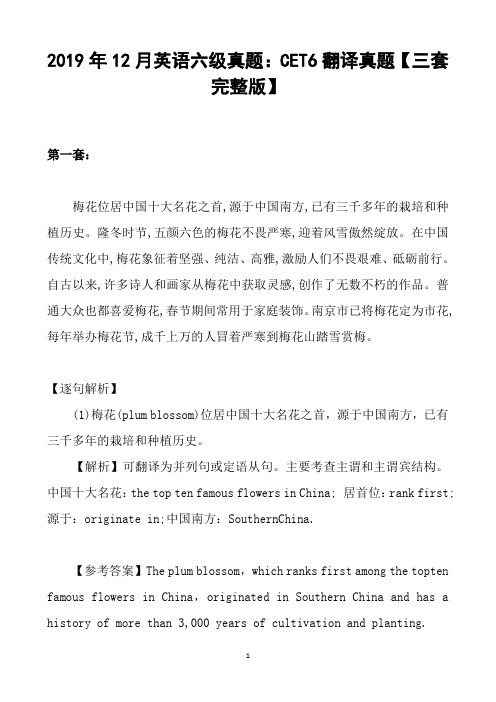
2019年12月英语六级真题:CET6翻译真题【三套完整版】第一套:梅花位居中国十大名花之首,源于中国南方,已有三千多年的栽培和种植历史。
隆冬时节,五颜六色的梅花不畏严寒,迎着风雪傲然绽放。
在中国传统文化中,梅花象征着坚强、纯洁、高雅,激励人们不畏艰难、砥砺前行。
自古以来,许多诗人和画家从梅花中获取灵感,创作了无数不朽的作品。
普通大众也都喜爱梅花,春节期间常用于家庭装饰。
南京市已将梅花定为市花,每年举办梅花节,成千上万的人冒着严寒到梅花山踏雪赏梅。
【逐句解析】(1)梅花(plum blossom)位居中国十大名花之首,源于中国南方,已有三千多年的栽培和种植历史。
【解析】可翻译为并列句或定语从句。
主要考查主谓和主谓宾结构。
中国十大名花:the top ten famous flowers in China; 居首位:rank first; 源于:originate in;中国南方:SouthernChina.【参考答案】The plum blossom,which ranks first among the topten famous flowers in China,originated in Southern China and has a history of more than 3,000 years of cultivation and planting.(2)隆冬时节,五颜六色的梅花不畏严寒,迎着风雪傲然绽放。
【解析】可翻译为并列句或简单句和伴随状语。
五颜六色的:colorful/of all colors绽放:bloom;迎着风雪:against the snow.【参考答案】At the time of midwinter, plum blossoms of all colors are not afraid of the cold, blooming proudly against the snow.(3)在中国传统文化中,梅花象征着坚强、纯洁、高雅、激励人们不畏艰难、砥砺前行。
2019英语六级考试翻译原文及解析(1)

2019英语六级考试翻译原文及解析(1)杭州是浙江省的省会城市的政治、经济和文化中心。
杭州历史悠久,是中国的七大古都之一。
杭州也是的旅游城市,被誉为人间天堂(paradise),意大利旅行家马可?波罗(Macro Polo)曾称赞它为“世界上最美丽华贵之城”。
位于市中心的西湖景区以其秀丽的湖光山色和众多的历史遗迹闻名中外。
杭州特产众多,其中以丝绸和茶叶欢迎。
1.第1句“杭州是......,是......”如依照原文采用并列结构表达为Hangzhou is the capital city of Zhejiang Province,and is...,则稍显平淡,不如将“是浙江省得省会城市”处理成“杭州”的同位语来得简洁和有层次感,译为Hangzhou,the capital city of Zhejiang Province, is...定语“政治、经济和文化”可用介词短语of politics, economy and culture来表达。
2.第2句“杭州历史悠久,是中国的……之一”可用并列结构译为Hangzhouhas a long history and isone of...,但结构较松散,不如将前半句处理为状语,用介词短语With a long history来表达,使译文更有逻辑性、结构更紧凑。
3.第4句中的“位于市中心的”可处理为地点状语,用分词短语locatedin the center of the city来译出。
“以其秀丽的湖光山色和众多的历史遗迹闻名中外”可套用be world-famousfor...(以......闻名世界)的结构来表达。
“众多的”可用many或numerous来表达。
4.最后一句的主干为“杭州特产众多”,可将其作为主句,其中“特产众多”意即“有众多特产”,所以翻译为Hangzhou boasts numerous special local products。
2019年12月大学英语六级翻译模块测评答案10.23

2019年12月大学英语六级翻译测评卷参考答案12019年12月大学英语六级翻译测评卷参考答案(一)Visitors to China are often surprised when a standard dinner for a table of eight people consists of four courses of cold dishes and four courses of hot dishes,coupled with soup and steamed rice.A standard banquet consists of four to eight prepared cold dishes,eight hot dishes served one at a time,and two to four whole-sized showpiece dishes.People at a table usually “Gan Bei"when toasting to each other.“Gan Bei”means to raise one's wine glass and drink it all the way down so that the glass or cup is “dried up to the last drop”.People drink up their wine to communicate the message to others that they are sincere and joyful.It is quite acceptable for a foreign guest to take a sip instead of emptying the glass when toasting to his or her host.2019年12月大学英语六级翻译测评卷参考答案2(二)According to a Chinese saying,no visit to Beijing is complete if you miss seeing the Great Wall or dining on Beijing Roast Duck.As a famous and delicious food with a very long history,Beijing Roast Duck is an excellent choice if you want to know more about Chinese cuisine,culture and customs.The two most famous restaurants that serve Beijing Roast Duck are Bianyifang Roast Duck Restaurant and Quanjude Roast Duck Restaurant.Both have a history of over one hundred years.The way to really enjoy the Roast Duck is as follows:first take one piece of the small,thin pancakes provided,spread it with sweet bean sauce,add small slices of spring onions and then some pieces of duck.Finally roll up the pancake and take a bite.You will be surprised by the terrific taste!2019年12月大学英语六级翻译测评卷参考答案3(三)Nowadays,offering tea to guests has become common etiquette in daily social interaction and family life.As the saying goes,white spirit,full cup;tea,half cup.Tea cup should be held on the right hand and offered to guests with a smile from their right side.Of course,the guests should pay respect as well,taking over the cup with both hands and nodding to express his thanks.When tasting tea,you should drink it in small sips,the beauty and fun of which is beyond words.In addition,you could praise the tea of the owner appropriately.In short,offering tea is a daily ritual of Chinese people when receiving guests and it is also part of social interaction.It can not only show respect to guests and friends,but also reflect your self-cultivation.。
英语六级翻译练习和参考答案

英语六级翻译练习和参考答案英语六级翻译练习和参考答案翻译练习是英语六级考试复习中的一个重要环节。
以下是阳光网边肖想和大家分享的英语六级翻译练习和参考答案,希望对大家有所帮助!英语六级翻译题的练习与参考答案(1)它是中国茶的故乡。
据说早在五六千年前,中国就有一种茶灌木,人类关于茶树的文明可以追溯到两千年前。
1000年前,来自中国的茶叶、丝绸和瓷器闻名于世,它们一直是中国重要的出口产品。
目前世界上有40多种xx茶,其中亚洲xx的产量占世界总产量的90%。
xx的其他茶树直接或间接源自中国。
[参考答案]中国是茶的故乡。
人们认为中国早在五六千年前就有茶灌木,人类种植茶树可以追溯到两千年前。
一千多年前,中国的茶叶连同其丝绸和瓷器开始为世人所知,并一直是中国重要的出口商品。
目前世界上有40多个国家种植茶叶,亚洲国家的茶叶产量占世界总产量的90%。
其他国家的所有茶树都直接或间接地起源于中国。
英语六级翻译题的练习与参考答案(二)英语六级翻译实践:中国传统文化[翻译实践]从某种意义上说,汉语是一种非常古老的语言,它的X早期汉字已有近4000年的历史。
在漫长的发展历史中,汉字演变成了许多不同的书写形式,如篆书、隶书、楷书和行书。
中国书法家经常通过夸大汉字的字形来达到艺术效果,比如旅游胜地的一些石刻。
中国书法是一门研究性的艺术,随着你学习兴趣的提高,我们会适时介绍中国书法的流派,以及如何欣赏中国书法的艺术性。
中国传统文化博大精深,源远流长。
早在2000多年前,儒家和道家,以及其他许多在中国思想史上有地位的学派就诞生了。
这就是著名的“百家”。
从孔子到孙中山,中国传统文化有许多宝贵的品质。
比如“天下兴亡,匹夫有责”的爱国情怀,“民为国本”、“民为贵,君为轻”的民本思想,“己所不欲,勿施于人”的行为准则。
【精彩翻译】中国传统文化博大精深,源远流长。
2 000多年前,中国出现了儒教和道教,以及许多在中国思想史上占有突出地位的理论和学说,它们都被著名的“百家”所涵盖。
四六级翻译真题练习
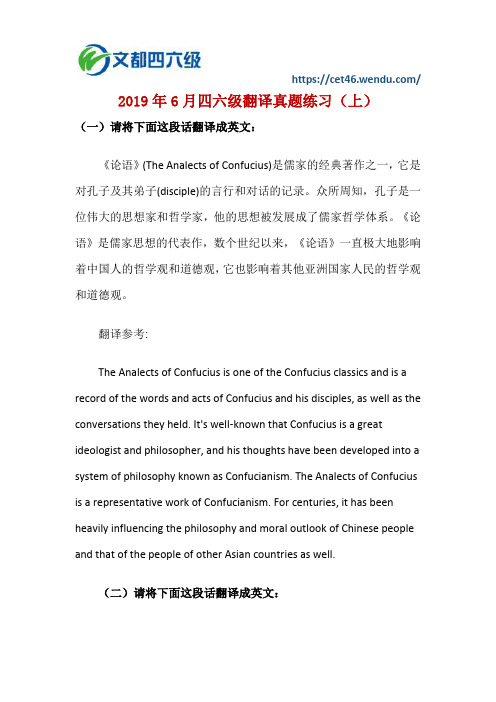
https:/// 2019年6月四六级翻译真题练习(上)(一)请将下面这段话翻译成英文:《论语》(The Analects of Confucius)是儒家的经典著作之一,它是对孔子及其弟子(disciple)的言行和对话的记录。
众所周知,孔子是一位伟大的思想家和哲学家,他的思想被发展成了儒家哲学体系。
《论语》是儒家思想的代表作,数个世纪以来,《论语》一直极大地影响着中国人的哲学观和道德观,它也影响着其他亚洲国家人民的哲学观和道德观。
翻译参考:The Analects of Confucius is one of the Confucius classics and is a record of the words and acts of Confucius and his disciples, as well as the conversations they held. It's well-known that Confucius is a great ideologist and philosopher, and his thoughts have been developed into a system of philosophy known as Confucianism. The Analects of Confucius is a representative work of Confucianism. For centuries, it has been heavily influencing the philosophy and moral outlook of Chinese people and that of the people of other Asian countries as well.(二)请将下面这段话翻译成英文:https:///泰山位于山东省西部。
2019年6月大学英语六级翻译真题参考答案及解析
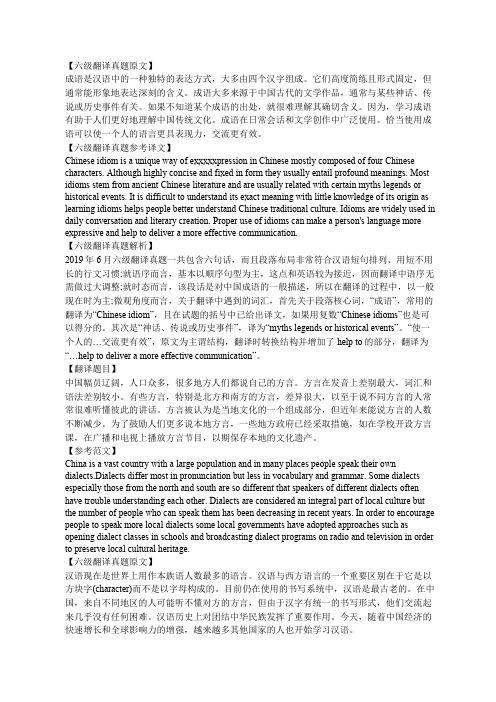
【六级翻译真题原文】成语是汉语中的一种独特的表达方式,大多由四个汉字组成。
它们高度简练且形式固定,但通常能形象地表达深刻的含义。
成语大多来源于中国古代的文学作品,通常与某些神话、传说或历史事件有关。
如果不知道某个成语的出处,就很难理解其确切含义。
因为,学习成语有助于人们更好地理解中国传统文化。
成语在日常会话和文学创作中广泛使用。
恰当使用成语可以使一个人的语言更具表现力,交流更有效。
【六级翻译真题参考译文】Chinese idiom is a unique way of exxxxxpression in Chinese mostly composed of four Chinese characters. Although highly concise and fixed in form they usually entail profound meanings. Most idioms stem from ancient Chinese literature and are usually related with certain myths legends or historical events. It is difficult to understand its exact meaning with little knowledge of its origin as learning idioms helps people better understand Chinese traditional culture. Idioms are widely used in daily conversation and literary creation. Proper use of idioms can make a person's language more expressive and help to deliver a more effective communication.【六级翻译真题解析】2019年6月六级翻译真题一共包含六句话,而且段落布局非常符合汉语短句排列、用短不用长的行文习惯;就语序而言,基本以顺序句型为主,这点和英语较为接近,因而翻译中语序无需做过大调整;就时态而言,该段话是对中国成语的一般描述,所以在翻译的过程中,以一般现在时为主;微观角度而言,关于翻译中遇到的词汇,首先关于段落核心词,“成语”,常用的翻译为“Chinese idiom”,且在试题的括号中已给出译文,如果用复数“Chinese idioms”也是可以得分的。
年六级翻译真题与参考解析
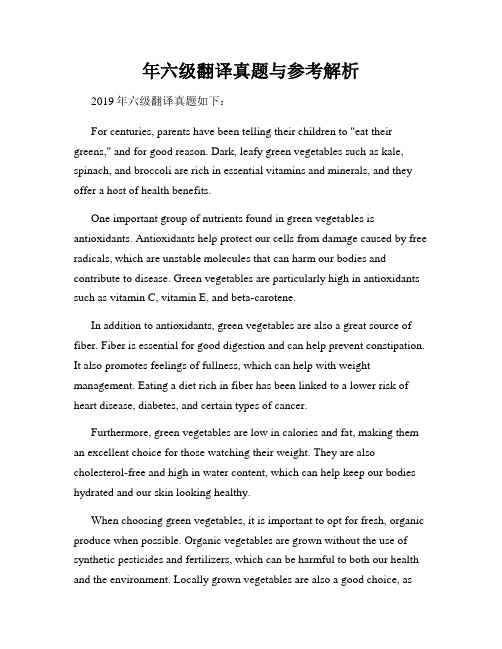
年六级翻译真题与参考解析2019年六级翻译真题如下:For centuries, parents have been telling their children to "eat their greens," and for good reason. Dark, leafy green vegetables such as kale, spinach, and broccoli are rich in essential vitamins and minerals, and they offer a host of health benefits.One important group of nutrients found in green vegetables is antioxidants. Antioxidants help protect our cells from damage caused by free radicals, which are unstable molecules that can harm our bodies and contribute to disease. Green vegetables are particularly high in antioxidants such as vitamin C, vitamin E, and beta-carotene.In addition to antioxidants, green vegetables are also a great source of fiber. Fiber is essential for good digestion and can help prevent constipation. It also promotes feelings of fullness, which can help with weight management. Eating a diet rich in fiber has been linked to a lower risk of heart disease, diabetes, and certain types of cancer.Furthermore, green vegetables are low in calories and fat, making them an excellent choice for those watching their weight. They are also cholesterol-free and high in water content, which can help keep our bodies hydrated and our skin looking healthy.When choosing green vegetables, it is important to opt for fresh, organic produce when possible. Organic vegetables are grown without the use of synthetic pesticides and fertilizers, which can be harmful to both our health and the environment. Locally grown vegetables are also a good choice, asthey are fresher and have a smaller carbon footprint compared to those that are transported long distances.To incorporate more green vegetables into your diet, consider adding them to salads, stir-fries, and soups. They can also be used as a topping for sandwiches or blended into smoothies for a nutrient-packed boost.In conclusion, green vegetables are not only delicious but also offer numerous health benefits. From their high antioxidant content to their fiber and water content, they are a powerhouse of nutrients. By incorporatingmore greens into our diets, we can improve our overall health and well-being.参考解析:在几个世纪以来,父母一直告诫孩子们要“多吃绿叶蔬菜”,理由充分。
2019年6月六级翻译练习与解析(下)
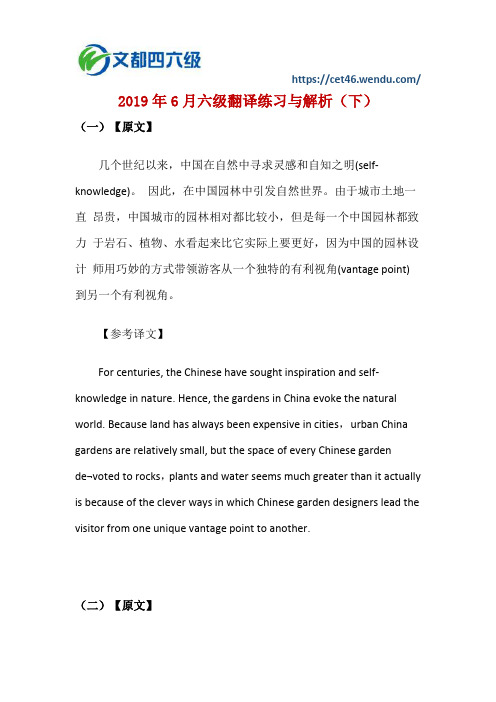
https:/// 2019年6月六级翻译练习与解析(下)(一)【原文】几个世纪以来,中国在自然中寻求灵感和自知之明(self- knowledge)。
因此,在中国园林中引发自然世界。
由于城市土地一直昂贵,中国城市的园林相对都比较小,但是每一个中国园林都致力于岩石、植物、水看起来比它实际上要更好,因为中国的园林设计师用巧妙的方式带领游客从一个独特的有利视角(vantage point)到另一个有利视角。
【参考译文】For centuries, the Chinese have sought inspiration and self- knowledge in nature. Hence, the gardens in China evoke the natural world. Because land has always been expensive in cities,urban China gardens are relatively small, but the space of every Chinese gardende¬voted to rocks,plants and water seems much greater than it actually is because of the clever ways in which Chinese garden designers lead the visitor from one unique vantage point to another.(二)【原文】https:///大熊猫(Giant Pandas),作为中国的国宝,被认为是活化石。
中国大熊猫主要生活在中国中西部和西南部,是目前濒临灭绝的物种。
换句话说,中国大熊猫的故乡是四川。
四川成都大熊猫繁育和研究中心(Chengdu Panda Breeding and Research Centre) 大熊猫的家,是市区附近最大的大熊猫基地。
英语六级翻译原文及答案

英语六级翻译原文及答案英语六级翻译原文及答案英语六级翻译对于很多人来说都是难点,为了帮助大家备考英语六级翻译,店铺整理了一些原文及参考答案,希望能帮到大家!英语六级翻译原文【1】随着中国经济的蓬勃发展,学汉语的人数迅速增加,使汉语成了世界上人们最爱学的语言之一。
近年来,中国大学在国际上的排名也有了明显的提高。
由于中国教育的巨大进步,中国成为最受海外学生欢迎的留学目的地之一就不足为奇了。
2015年,近四十万国际学生蜂拥来到中国学习。
他们学习的科目已不再限于中国语言和文化,而包括科学与工程。
在全球教育市场上,美国和英国仍占主导地位,但中国正在迅速赶上。
参考译文:As China’s economy booms, there is a dramatic increase in the number of people learning Chinese, which makes it become one of the most popular languages. In recent years, international ranks of Chinese universities have apparently boosted. Owing to the progress of Chinese education, it is not odd that China has become one of the most favorite destinations for oversea students studying abroad. In 2015, around four hundred thousand international students piled into China to study. What they learn is no more limited to the subjects of Chinese and Chinese culture, they also learn science and engineering. In the global education market, America and Britain still play dominant roles, while China is catching up.英语六级翻译原文【2】农业是中国的一个重要产业,从业者超过3亿。
2019年6月大学英语六级翻译真题参考答案及解析

【六级翻译真题原文】成语是汉语中的一种独特的表达方式,大多由四个汉字组成。
它们高度简练且形式固定,但通常能形象地表达深刻的含义。
成语大多来源于中国古代的文学作品,通常与某些神话、传说或历史事件有关。
如果不知道某个成语的出处,就很难理解其确切含义。
因为,学习成语有助于人们更好地理解中国传统文化。
成语在日常会话和文学创作中广泛使用。
恰当使用成语可以使一个人的语言更具表现力,交流更有效。
【六级翻译真题参考译文】Chinese idiom is a unique way of exxxxxpression in Chinese mostly composed of four Chinese characters. Although highly concise and fixed in form they usually entail profound meanings. Most idioms stem from ancient Chinese literature and are usually related with certain myths legends or historical events. It is difficult to understand its exact meaning with little knowledge of its origin as learning idioms helps people better understand Chinese traditional culture. Idioms are widely used in daily conversation and literary creation. Proper use of idioms can make a person's language more expressive and help to deliver a more effective communication.【六级翻译真题解析】2019年6月六级翻译真题一共包含六句话,而且段落布局非常符合汉语短句排列、用短不用长的行文习惯;就语序而言,基本以顺序句型为主,这点和英语较为接近,因而翻译中语序无需做过大调整;就时态而言,该段话是对中国成语的一般描述,所以在翻译的过程中,以一般现在时为主;微观角度而言,关于翻译中遇到的词汇,首先关于段落核心词,“成语”,常用的翻译为“Chinese idiom”,且在试题的括号中已给出译文,如果用复数“Chinese idioms”也是可以得分的。
2019六级翻译新题型强化训练及译文(1)

2019六级翻译新题型强化训练及译文(1)中国民间艺术与中国哲学统一于“阴阳(yin-yang)生万物”这个理念。
这个理念源于中国原始社会,是对人类的人生感悟的哲学注解。
中国人祖先的哲学论断是“近看自己,远观他人”。
要理解中华民族民间艺术的原始艺术,这个结论必不可少。
人类的本能欲望是生存并通过繁衍(propagation)继续存有。
人生来的首要本能是求生,然后是长寿。
从原始社会到今天,阴阳和永生的观点始终贯穿中国的社会生活和民族文化。
中国民间艺术反映了社会的所有基本哲学理念。
参考翻译:Chinese folk art and Chinese philosophy are unifiedinthe belief that yin-yang produces all living things inthe world. Originated in Chinese primitive society,this was the philosophical explanation of human'sperception of life. Chinese ancestors philoso phicalconclusion was to “look at oneself up close and other creatures from afar”,which is essentialto the understanding of the primitive art to thefolk art of the nation. To live and to continuelife through propagation are the two instinctive desires of human. From birth, a person's firstinstinct is to survive, and then tolive a long life. From primitive society to the presentday,the view of yin-yang and perpetual life has permeated inall aspects of social life and thenational culture of Chinese society.Chinese folk art reflects all of the basic philosophicalconcepts.。
- 1、下载文档前请自行甄别文档内容的完整性,平台不提供额外的编辑、内容补充、找答案等附加服务。
- 2、"仅部分预览"的文档,不可在线预览部分如存在完整性等问题,可反馈申请退款(可完整预览的文档不适用该条件!)。
- 3、如文档侵犯您的权益,请联系客服反馈,我们会尽快为您处理(人工客服工作时间:9:00-18:30)。
2019英语六级翻译每日一练及译文(1)
中国式礼仪
每种文化都有自己的行为准则,中国也不例外。
在中国,跟别人
打招呼时,你或者点个头,或者微微鞠个躬。
握手也很常见,但你要
等到中国朋友先伸手才能够。
另外,与西方社会的做法截然相反,中
国人不太喜欢被陌生人触碰。
所以不要轻易地触碰别人,除非你完全
有这样的必要。
最后一点,根据儒家思想 (Confiicianism)的观点,
老人在任何情况下都应该受到年轻人的尊敬。
你应该总是以老人为先,并对他们表本的敬意。
翻译:Every culture has its rules on how to act,and China is no different. In China,to greet someone, you nod
your head,or you bow slightly. Handshakes are also common,
but you should wait for your Chinese partner to initiate the motion. In addition,as opposed to those found in Western society,Chinese people do not enjoy being touched by strangers. Don’t touch someone unless you absolutely have
to.Finally, from the perspective of Confucianism, the elders are to be respected in every situation by those who are younger. You should always acknowledge the elders first,and show the most respect to them.
讲解:1.行为准则:有多种译法,如rules on how to act,
rules of conduct或standard of behavior。
2.中国也不例外:可译为China is no different或China is
no exception。
3.打招呼:即greet。
4.截然相反:可译为as opposed to。
5.在任何情况下:可使用短语in every situation表达。
6.以老人为先:可译为acknowledge the elders first。
